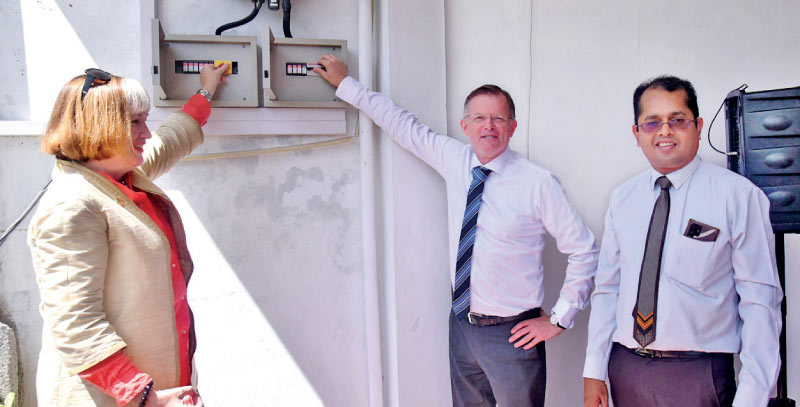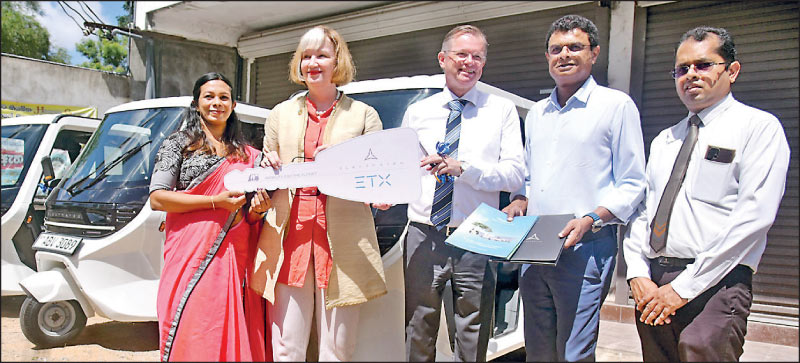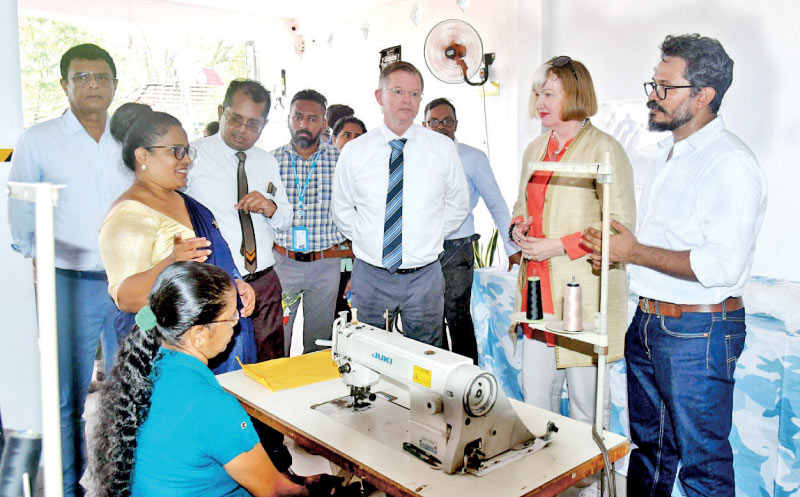Monday Feb 23, 2026
Monday Feb 23, 2026
Thursday, 3 October 2024 00:00 - - {{hitsCtrl.values.hits}}

ILO Country office for Sri Lanka and Maldives Director Joni Simpson (left) and Netherlands Deputy Ambassador Iwan Rutjens officially switch on the solar power system

ILO Country office for Sri Lanka and Maldives Director Joni Simpson (second from left), Netherlands Deputy Ambassador Iwan Rutjens, CODEGEN Director Kusal Subasinghe and National Enterprise Development Authority Director Dhanuka Liyanagamage at the officially hand over of electric three wheel

|
Hirunya Garments Owner Chandima Pushpani
|
By Divya Thotawatte
Backed by a € 300,000 investment from Foreign Affairs Ministry of the Netherlands, a cluster project in Gampaha, recently equipped local batik SMEs with solar panels and commercially produced electric three-wheelers including commercial chargers, driving growth and sustainability in Sri Lanka’s apparel industry.
The project named “Healthy socio-economic recovery of apparel sector, Micro and Small enterprises in severely COVID-19 impacted Gampaha District of Sri Lanka” is funded by the Netherlands Government and implemented through the International Labour Organisation (ILO) in collaboration with National Enterprise Development Authority (NEDA). The project was implemented with the objective of supporting economic recovery, stimulating the growth and addressing issues in Sri Lanka’s batik and apparel industry such as waste management, rising energy costs, challenges in finding markets and shortage of skilled artisans.
Speaking at the event, Deputy Ambassador of the Netherlands to Sri Lanka Iwan Rutjens said, “SMEs are the bedrock of Sri Lanka’s economy, accounting for around three quarters of the total number of enterprises active in the country. But they lack innovation that can drive economic growth forward and increase its efficiency, safety and competitiveness. It is time to green-up the sector. Investment in sustainable technology can help speed-up the economic recovery, build the resilience of employees and companies.”
Benefitting approximately 350 entrepreneurs across the batik and apparel clusters in Gampaha, the project was initially launched in 2023 with two main components; a grant component and a capacity building component of MSMEs as well as NEDA to reshape the batik sector and empower its SMEs.
At the event, ILO Country Director for Sri Lanka and the Maldives Joni Simpson emphasised that these initiatives would play a vital role in promoting women’s entrepreneurship development and gender equality. By doing so, they help create greater opportunities for low-income women and their families to secure sustainable employment and income through the development of women’s enterprises.
The grants include distributing more than 30 machines to enhance productivity and solar panels for over seven beneficiaries’ factories. The distribution of the machines is expected to significantly enhance the productivity across the clusters, empowering businesses to meet market demands more effectively. The installation of solar panels would also address rising energy costs, allowing businesses to operate more sustainably while reducing their carbon footprint.
Electric three-wheelers were provided for the selected SMEs with the aim of reducing energy costs which are often too high in Sri Lanka. This sustainable transportation solution, ETX, was developed and manufactured by Elektrateq, a subsidiary of VEGA Innovations. NEDA Director Dhanuka Liyanagamage said that unlike the prototypes seen on the road today, “these four electric three wheelers are also the first ever commercially produced full electric three-wheelers in Sri Lanka.”
The training includes sessions with the Sri Lanka Institute of Textile and Apparel and the University of Moratuwa, Apparel and Textile Engineering Department to address the need for skilled artisans in the industry. The topics covered by the workshops include occupational safety and health (OSH), financial literacy, Apparel development, etc.
Further demonstrating its commitment to sustainable practices, the project introduced a sales outlet constructed from a container box, for the Suraksha Batik Centre, offering a new retail space for local artisans to showcase and sell their products.
One of the remarkable breakthroughs of the project was the discovery of the zero-waste batik production method by JK Style Creation, spearheaded by Prabath Priyanka Ranagalage and Randika Prasadani. The method, which has been applied for a patent, is on its way to becoming a commercially viable product, poised to benefit batik artisans across Sri Lanka and beyond.
Additionally, the project will have a focus on expanding the industry from conventional sarongs and saris to produce beachwear, shirts, ties, etc.
Batik was introduced to Sri Lanka by the Netherlands during the Dutch colonial era. Therefore, the industry is significant to the Netherlands Government, which is keen on developing Sri Lanka’s batik sector, said Liyanagamage.
– Pix by Ruwan Walpola